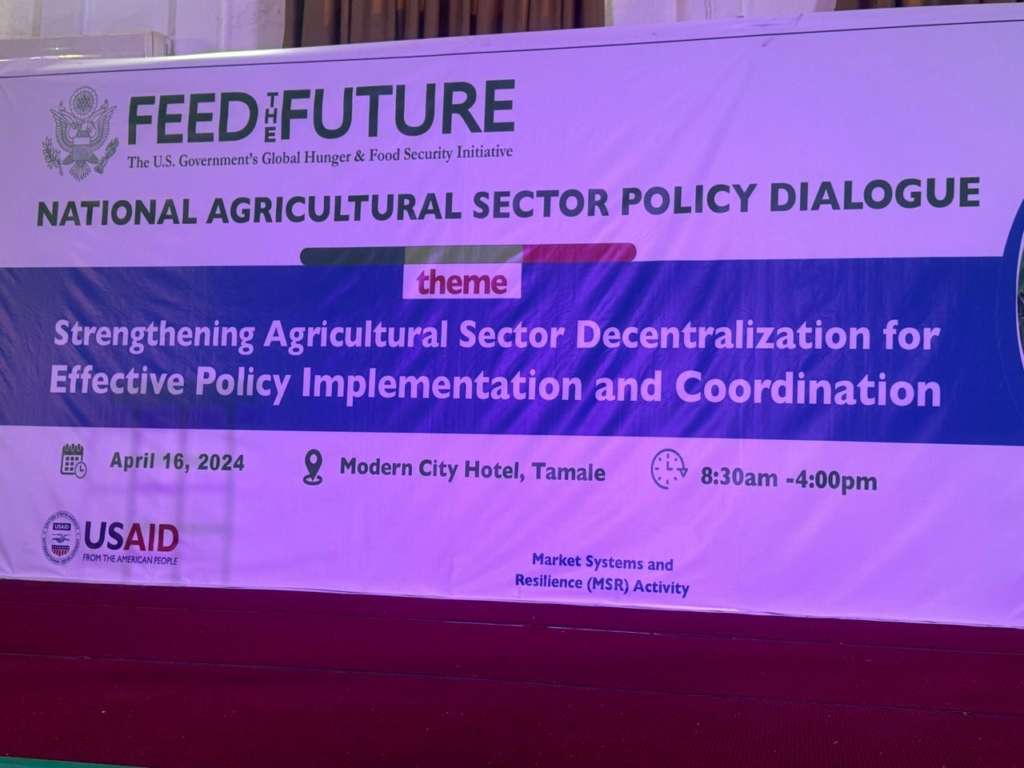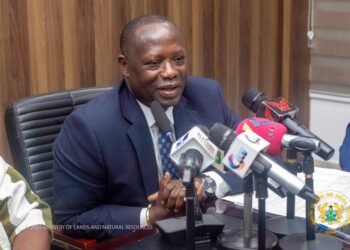Speaker of Ghana’s Parliament, Alban Sumana Bagbin, has emphasized the importance of extending cooperation and engagements on policy and governance beyond the executive arm of government to achieve accelerated impact.
Speaking on behalf of the Speaker of Parliament was the MP for Wa East constituency, Dr Godfred Seidu Jasaw, who doubles as the Deputy Ranking Member on the Food, Agriculture and Cocoa Affairs Committee of Parliament. This call was made during a National Agricultural Policy Dialogue organized by Policy Link and Market Systems Resilience Activity, sponsored by USAID’s Feed the Future program. The dialogue focused on “Strengthening decentralization for effective agricultural sector policy implementation and coordination.”
“Parliament wields the Power of the Purse and it was easier to carry MPs along when they have sufficient information about a particular policy issue or/and its budget line. It is therefore paramount to extend the policy space to include the people’s representatives at every stage of activity implementation.”
Dr Godfred Seidu Jasaw, MP for Wa East constituency
Dr. Godfred Seidu Jasaw highlighted the well-established structures and institutions of decentralized governance as outlined in the 1992 Constitution of Ghana. However, he identified a challenge in ensuring effective lateral and vertical coordination between different arms, structures, and institutions, as well as maintaining consistency and coherence in policies.
To address this, Dr. Jasaw urged the nation to quickly employ pragmatic actions to further decentralize the implementation of policies and programs, emphasizing the need for appropriate key performance indicators for effective monitoring.
Dr. Jasaw further assured them of Parliament’s readiness to support efforts at strengthening the decentralization of the agricultural sector and urged the District Assemblies to conscientiously embrace the integration of District Directorates of Agriculture for a better impact on the livelihoods of the citizens.
The dialogue included representatives from the National Development Planning Commission (NDPC), members of parliamentary committees on Local Government and Rural Development, Food, Agriculture and Cocoa Affairs, academics, the private sector, media, development partners, and other stakeholders.
Also, the dialogue called for a sustained decentralized agricultural policy implementation, timely disbursement of resources for agricultural production activities, and the establishment of dedicated funds like the NHIA Fund and GETFUND for Food Security.
Additionally, there was a call for reviewing the District Assemblies Common Fund (DACF) allocation formula to include food security under the basic needs component.
Need to Accelerate Impact on Agricultural Policy

Representatives who are directly connected to the communities and farmers can bring local knowledge and insights into policy discussions. This can lead to more effective and tailored policies that address the specific needs and challenges of the local agricultural sector.
“Members of Parliament play a crucial role in engaging with their local communities and stakeholders. This engagement can help identify and prioritize issues, gather feedback, and ensure that policies are responsive to the needs of the people they serve. It can also foster a sense of ownership and commitment among the community members towards the implementation of these policies.”
Dr Godfred Seidu Jasaw, MP for Wa East constituency
Moreover, representatives of the people can advocate for policies that support sustainable and regenerative agricultural practices within their constituencies. They can also provide support to farmers and ranchers, especially those from marginalized and oppressed groups, to participate in national coalitions and policy discussions. This can help ensure that a wide range of voices are heard and that policies are inclusive and equitable.
Dr. Jasaw, on behalf of the Speaker of Parliament, commended those organizers of the Dialogue for their civil societal role in promoting food security through agriculture production in Ghana.
The involvement of people’s representatives at every stage of policy implementation can enhance the effectiveness and impact of agricultural policies by ensuring they are informed by local knowledge, inclusive of community needs, and supported by a broad range of stakeholders. This can lead to more sustainable and resilient agricultural systems that meet the needs of both the environment and the communities they serve.
READ ALSO: WTO Projects Global Trade Rebound in 2024, But Risks Remain



















